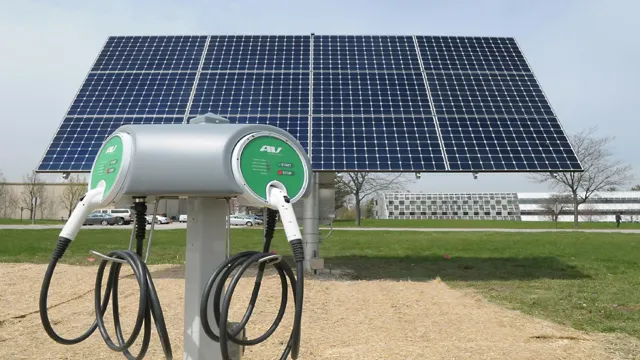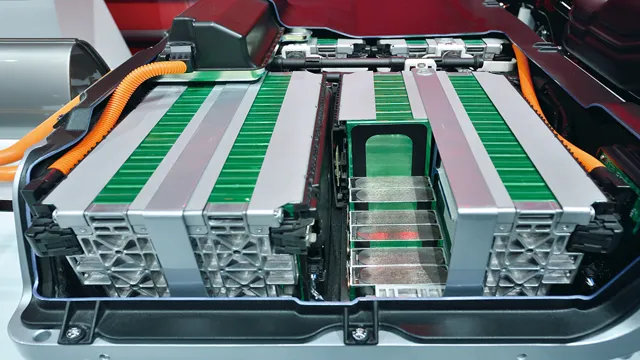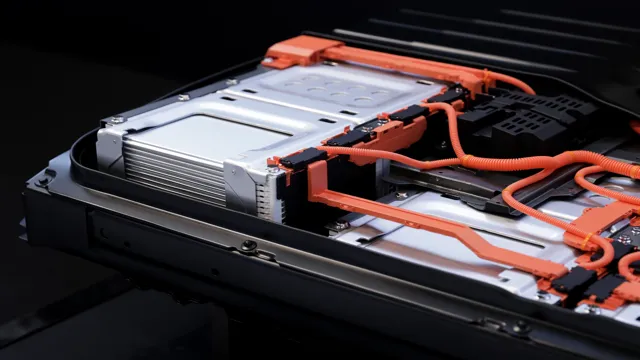Uncovering the Truth: Are Electric Car Batteries Truly Renewable?
As climate change continues to be a looming threat, there has been a growing interest in sustainable transportation. Electric cars have been lauded as a significant step towards reducing our carbon footprint, but there is a common question among consumers: are electric car batteries renewable? This has become a hot topic as the use of electric cars becomes more prevalent around the world. With the increasing need to ditch the traditional, fossil fuel-powered cars for eco-friendlier alternatives, it’s essential to understand how electric car batteries contribute to carbon neutrality.
In this blog, we will delve into the nitty-gritty of electric car batteries and examine whether they are truly renewable.
What Makes a Battery Renewable?
Electric car batteries are not completely renewable, but they are sustainable in the sense that they have a longer lifespan than traditional car batteries. This is because they are often made with materials that can be recycled, such as lithium-ion and nickel-metal hydride. Additionally, many electric car manufacturers offer the option to refurbish or repurpose old batteries, further extending their useful life.
However, the production of these batteries does have an environmental impact, as the mining and extraction of the materials used can be energy-intensive and polluting. To truly make electric cars a renewable form of transportation, we need to focus on developing more efficient and cleaner processes for creating and recycling their batteries.
Explaining the Differences in Electric Car Batteries
When it comes to electric car batteries, the term “renewable” is often associated with them. But what exactly makes them renewable? Firstly, it’s important to note that not all electric car batteries are renewable. Lithium-ion batteries, which are the most commonly used type of battery in electric cars, are not renewable.
However, research is being done to find ways to recycle and reuse these batteries to reduce waste. On the other hand, some renewable electric car batteries use materials like zinc or iron, which have a higher chance of being recycled and reused. Additionally, some companies are exploring the use of organic materials like hemp to create renewable batteries.
These materials can be grown and replenished, making them a more sustainable option. Overall, the renewable aspect of electric car batteries depends on the materials used and the potential for recycling and reusing them.

How Do Electric Car Batteries Work?
Electric Car Batteries Electric car batteries work by converting chemical energy to electrical energy, which powers the vehicle. They are made up of several cells or modules that are connected in series and arranged in a pack. Each cell contains an anode (negative electrode), a cathode (positive electrode), and an electrolyte solution.
When the battery is charged, electrons flow from the anode to the cathode through an external circuit, while ions move from the cathode to the anode through the electrolyte. When the battery is discharged, this process is reversed. What makes a battery renewable is its ability to be recharged and used repeatedly.
Unlike fossil fuels, which are finite resources that are depleted with each use, electric car batteries can be recharged using renewable energy sources such as solar, wind, and hydropower. By harnessing renewable energy to recharge electric car batteries, we can reduce our dependence on nonrenewable resources and reduce greenhouse gas emissions. Additionally, advancements in battery technology and recycling methods are making electric car batteries more sustainable and environmentally friendly.
Overall, electric car batteries are a crucial component of the transition to a more sustainable transportation system.
Renewable and Non-Renewable Materials in Electric Car Batteries
Electric car batteries use a combination of both renewable and non-renewable materials. The renewable materials used in electric car batteries include lithium and cobalt, which can be recycled and reused. On the other hand, non-renewable materials such as nickel, manganese, and aluminum are used in the manufacturing of electric car batteries.
While these materials are not renewable, efforts are made to source them sustainably. Recycling and repurposing efforts for electric car batteries also contribute to reducing the overall environmental impact of the vehicle. So, while electric car batteries may not be completely renewable, efforts are being made to minimize their impact on the environment by sourcing materials sustainably and promoting recycling initiatives.
The Renewable Materials Used in Electric Car Batteries
The renewable materials used in electric car batteries are becoming increasingly important as the need for sustainable transportation options grows. These types of batteries typically contain a combination of renewable and non-renewable materials. Some of the renewable materials commonly used include lithium, cobalt, and nickel.
These materials are considered renewable because they are readily available and can be extracted from the earth relatively easily. However, they must still be mined and processed, and there are concerns about the environmental impact of these processes. On the other hand, non-renewable materials, such as graphite and aluminum, are also commonly used in electric car batteries.
These materials are not renewable and must be extracted from the earth, often in a way that is harmful to the environment. Overall, there is a need to balance the use of renewable and non-renewable materials in electric car batteries to create a sustainable and eco-friendly transportation system.
The Non-Renewable Materials Used in Electric Car Batteries
Electric car batteries are made up of both renewable and non-renewable materials. While the renewable components like lithium and cobalt are vital for battery performance, the non-renewable materials that go into making electric car batteries are becoming a growing concern. These materials, such as nickel, copper, and aluminum, are finite resources that could become depleted in the near future.
Additionally, the extraction and production of these materials come with environmental and ethical concerns, especially when it comes to cobalt mining in areas like the Democratic Republic of Congo. As the demand for electric vehicles grows, it is important for companies to consider the sustainability of their battery production and search for alternatives to reduce the reliance on non-renewable materials. By investing in research and development, we can find ways to create long-lasting and efficient batteries while also being mindful of the impact on the environment and society as a whole.
The Environmental Impact of Manufacturing Electric Car Batteries
Electric car batteries are considered one of the most important components of an electric car. However, their manufacturing process can have severe environmental impacts. Electric car batteries are made up of both renewable and non-renewable materials.
Lithium, cobalt, and nickel are some of the most commonly used non-renewable materials in manufacturing electric car batteries. The production of these materials requires a significant amount of energy, and their mining can lead to soil and water pollution. On the other hand, renewable materials such as aluminum and copper are also used in electric car batteries.
They are less harmful to the environment as they can be easily recycled. The manufacturing process of electric car batteries has improved over the years, and technologies are being developed to reduce the impact on the environment. Still, it is essential to keep in mind that while electric car batteries are better for the environment in the long run, their production process can have significant environmental impacts.
It is the responsibility of manufacturers and consumers to make sustainable choices to protect the environment.
The Future of Electric Car Batteries and Renewability
When it comes to the future of electric car batteries and renewability, the question arises: are electric car batteries renewable? While the batteries themselves may not be considered renewable, there are efforts being made to ensure that their components are recyclable and sustainable. This includes the use of materials like lithium, cobalt, and nickel, which can be extracted from old batteries and reused in new ones. Additionally, companies like Tesla are creating closed loop systems, where batteries are designed to last for over a decade and can be recycled multiple times.
Ultimately, the goal is to create a circular economy where materials are constantly being reused, reducing the need for new resources and decreasing the environmental impact of electric car production. While there is still progress to be made, the future looks promising for electric car batteries and their potential for renewability.
Advancements in Battery Renewability Technology
Electric car batteries have come a long way in recent years, and advancements in renewable battery technology are on the horizon. The future of these batteries is becoming increasingly promising, with the potential to revolutionize the way we use and store energy. One notable development is the use of recycling and repurposing techniques for old batteries, which reduces waste and gives the batteries a second life.
Another innovation is the use of materials that are more sustainable and less harmful to the environment. This technology will enable electric cars to become more affordable, accessible, and sustainable in the long run. The use of renewable energy sources such as solar power can also help to extend the lifespan of electric car batteries, reducing the need for replacements and minimizing waste.
As we move towards a more environmentally-friendly future, it’s exciting to see how these advancements in electric car batteries will play a significant role in shaping the world we live in.
Potential for Recycling and Sustainability in Electric Car Battery Manufacturing
The future of electric car batteries seems bright with the potential for recycling and sustainability. As the world becomes more aware of the environmental impact of fossil fuel usage, the demand for electric vehicles continues to rise. Manufacturers are continually looking for ways to improve the efficiency and sustainability of electric car batteries, and one such way is through recycling.
The lithium-ion batteries used in most electric vehicles can be recycled to extract valuable metals, such as cobalt, nickel, and lithium, that can be repurposed for new battery production. This reduces the need for new mining and lowers the environmental impact of producing new batteries. Additionally, manufacturers are exploring the use of more sustainable materials, such as solid-state batteries that use less harmful chemicals and are more energy-dense.
As the technology continues to progress, the potential for electric car batteries to be fully sustainable and recyclable is becoming increasingly possible.
Wrapping Up
After exploring the topic, it’s safe to say that electric car batteries are not renewable, at least not in the traditional sense. While the materials used in the battery, such as lithium, can be recycled and repurposed, they are not infinite resources. Additionally, the production of these batteries and the mining of the materials required can have negative environmental impacts.
However, the shift to electric vehicles still provides numerous benefits, including a decrease in emissions and reduced dependence on fossil fuels. It’s important to continue research and innovation in the field of renewable energy, including the development of more sustainable battery solutions. So, while electric car batteries may not be fully renewable, they are still a step in the right direction towards a greener future.
Conclusion
In conclusion, asking if electric car batteries are renewable is like asking if pizza is healthy. It’s not about whether they are renewable or not, but rather about the impact they have on the environment. Electric car batteries may not be renewable in the traditional sense, but they are much better for the planet than traditional gasoline-powered vehicles.
Plus, with advancements in battery technology, we may soon see even more sustainable options. So, the real question should be, when are you getting your electric car?”
FAQs
What are the materials used in electric car batteries?
Electric car batteries are made of materials such as lithium, nickel, and cobalt.
Can electric car batteries be reused or recycled?
Yes, electric car batteries can be reused or recycled. In fact, there are companies that specialize in repurposing used electric car batteries for energy storage.
How long do electric car batteries last?
The lifespan of an electric car battery depends on factors such as usage, charging habits, and environmental conditions. Generally, electric car batteries last between 8 to 10 years.
Are electric car batteries a sustainable energy solution?
There is debate over whether electric car batteries are a sustainable energy solution, as they do require mining and processing of rare metals. However, compared to traditional gasoline-powered cars, electric cars produce significantly lower emissions and are a promising step towards reducing carbon emissions.






